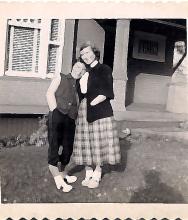Each year, in the final few hours of the last day of December, many people all across North America gather with friends to raise a glass and sing Robert Burns’s famous ballad, “Auld Lang Syne.” Standing at the brink of a New Year, arms around each other, they ask: “Should old acquaintance be forgot, and never brought to mind?” The question is meant to be rhetorical, of course — the answer is “No.” The years may pass, but we should hold on to our friends.
For many older adults, however, this question takes on a different meaning, as they confront the onset of dementia in a friend. Dementia affects cognitive abilities such as language and memory that are often understood as the necessary foundation for individual identity and human personhood. As such, dementia raises questions about what are the boundaries of the human, what is required to have meaningful social relationships, and more generally what makes life worth living (or no longer worth living). It is no accident that people with dementia are often rhetorically and metaphorically likened to zombies, and that dementia is described — even by medical professionals — as “a condition both of death-in-life and of life-in-death.” Such ideas contribute greatly to the stigma, fear, and shame that commonly attend a diagnosis of dementia. And if dementia is one of the most dreaded forms of decline associated with aging, it is also one of the most common, affecting approximately seven percent of people over age 60, its prevalence approximately doubling for every five years of additional age — rising from about two percent at age 65, to about fifty percent at age 90.
What is it like for people to experience the onset of dementia in a friend, and how do they respond? Close family members are often expected to step up to meet the challenges of dementia, and many try to do so — but it is less clear what role friends can or should play, and little research has addressed the topic. Two recent pieces published by Professor Janelle Taylor offer insights based on interviews with individuals who self-identify as friends of someone with dementia. The basic idea behind her research is that there may be lessons to learn from those who have found both reasons and ways to maintain relations of friendship after the onset of dementia, lessons that could be shared with others who find themselves confronting similar situations.
How friends respond to dementia is important for a number of reasons. First and foremost, friendships matter to older adults with dementia for all the same reasons that friendships matter to anyone: they are sources of pleasure, support, and social identity. Second, the difficulties and burdens faced by informal/unpaid caregivers of people with dementia (mostly female relatives) might be less overwhelming if friends and other relations remained more present in the lives of people with dementia. Third, there are a large and growing number of older adults with dementia who — due to changing patterns of marriage, childbirth, longevity, residential arrangements, and geographic mobility — simply do not have family members available and willing to step into caregiver roles; for them, how friends, neighbors, coworkers and others respond can be a matter of life-and-death importance.
Taylor’s research documents how some people find value, interest, meaning and pleasure in friendships with people who have dementia. Among the findings reported in her new publications, several stand out. First, Taylor finds that through experience people gain specific forms of knowledge about how to interact well with the person who has dementia — knowledge that can be shared with others. Second, her interviews make clear that talking about dementia — in other words, making it "speakable" — can be a critical first step toward approaching it collectively instead of only as an individual problem. Third, people who have spoken with Taylor describe friendship after dementia as a relationship that is capable of changing, rather than simply enduring. And finally, people who have remained engaged as friends after the onset of symptoms describe dementia as an impetus for personal and interpersonal transformations that can involve learning, growth, and unexpected gifts — as well as sadness and loss.
Dementia can seem like a frightening and depressing topic, but this research has given Taylor reasons to feel hopeful. “Medicine has at present no cure and few effective treatments to offer,” she says, “but that does not mean that there is ‘nothing we can do.’ There is a lot we can do to make life better for older adults with dementia. And we ought to do what we can — not only because people with dementia are fellow members of our human community, but also because any one of us might find ourselves affected in the future.”
One of the verses of Auld Lang Syne that is less often sung by New Year’s revelers includes the line: “We’ll take a cup of kindness yet, for Auld Lang Syne.” Helping people faced with the onset of dementia in a friend learn from others how to fill, share, and take sustenance from that “cup of kindness,” is one of the many ways that anthropological research strives to make the world a bit better place.
Janelle S. Taylor. 2017. “Engaging with Dementia: Experiments in Art and Friendship.” Culture Medicine and Psychiatry 41(2):284-303.
Janelle S. Taylor. 2017. “Should Old Acquaintance Be Forgot? Friendship in the Face of Dementia,” in Sarah Lamb, ed., Successful Aging as a Contemporary Obsession: Global Perspectives. New Brunswick, NJ: Rutgers University Press, pp. 126-138.
